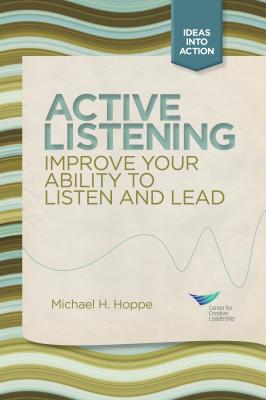Active Listening: Improve Your Ability to Listen and Lead, First Edition. Michael H. Hoppe
Чтение книги онлайн.
Читать онлайн книгу Active Listening: Improve Your Ability to Listen and Lead, First Edition - Michael H. Hoppe страница

IDEAS INTO ACTION
ACTIVE LISTENING
IMPROVE YOUR ABILITY TO LISTEN AND LEAD
Michael H. Hoppe
IDEAS INTO ACTION SERIES
Aimed at managers and executives who are concerned with their own and others’ development, each book in this series gives specific advice on how to complete a developmental task or solve a leadership problem.
LEAD CONTRIBUTOR
Michael H. Hoppe
CONTRIBUTORS
Wilfred Drath
Chris Ernst
Cynthia D. McCauley
Lisa Moye
SPECIAL CONTRIBUTOR
Rie Ingold
DIRECTOR OF ASSESSMENTS, TOOLS, AND PUBLICATIONS
Sylvester Taylor
MANAGER, PUBLICATION DEVELOPMENT
Peter Scisco
EDITOR
Stephen Rush
ASSOCIATE EDITOR
Shaun Martin
WRITER
Rebecca Garau
DESIGN, LAYOUT, AND COVER DESIGN
Ed Morgan, navybluedesign.com
RIGHTS AND PERMISSIONS
Kelly Lombardino
Copyright ©2014 Center for Creative Leadership.
All Rights Reserved. No part of this publication may be reproduced, stored in a retrieval system, or transmitted, in any form or by any means, electronic, mechanical, photocopying, recording, or otherwise, without the prior written permission of the publisher. Printed in the United States of America.
CCL No. 430
ISBN-13: 978-1-882197-94-1
ISBN-10: 1-882197-94-1
Center for Creative Leadership
CONTENTS
The Active Listening Skill Set
How to Improve Your Listening Skills
In Brief
Active listening is a person’s willingness and ability to hear and understand. At its core, active listening is a state of mind that involves paying full and careful attention to the other person, avoiding premature judgment, reflecting understanding, clarifying information, summarizing, and sharing. By learning and committing to the skills and behaviors of active listening, leaders can become more effective listeners and, over time, improve their ability to lead.
Listening and Leadership
Jim is a smart, successful leader and a likeable coworker. Six months ago, he took on a job with greater responsibility in a new division. To his surprise, he’s having difficulty leading his new group. He is unable to pinpoint the reason for the friction between himself and several of his direct reports, and he’s frustrated that his new group hasn’t jelled. He calls one of his direct reports in to address the issue. Here’s how it goes:
Jim: Mary, we need to talk. There’s obviously some friction between us, and it’s having a bad effect on the whole group. What’s the problem?
Mary (caught off guard and not knowing where to start): Well, I would say that one problem is that we don’t have enough flexibility— (Jim’s cell phone rings; he answers it and swivels his chair, looking out the window while he talks.)
Jim (ending the call and turning back to Mary): Okay, you were saying…?
Mary: …that we don’t have enough flexibility—
Jim: Not enough flexibility? No, that’s not it. We have that floating holiday, and you can take your lunch hour anytime between 12:00 and 1:30. How much more flexibility do you want?
Mary: It’s just that it would help a lot if I could take a shorter lunch and leave a few minutes earlier in the afternoon. If I don’t get to my son’s daycare by 6:00, they charge me a dollar a minute—
Jim: Now, Mary, you know you can’t expect special favors just because you have a child. That wouldn’t be fair to everyone else.
Mary (voice trembling, but trying to maintain composure): I see…
Jim (standing abruptly and motioning Mary toward the door): Yes! Well! Thank you! I’m glad we had this talk! And remember that my door is always open. Thanks!
Fortunately, most real leaders do better than Jim. But like him, many take for granted their ability to listen to others. They are often surprised to find out that their peers, direct reports, or bosses think they don’t listen well and are impatient, judgmental, arrogant, or unaware.
Assessments of thousands of leaders in CCL’s database indicate that many leaders have development needs that directly relate to their listening skills:
• dealing with people’s feelings
•